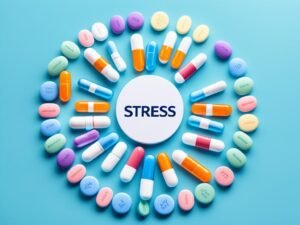Are you feeling stressed out? Well, you’re one of the 80% of individuals feeling the same way. Things like work, money problems, health, and family can make you anxious. But there’s help. Besides eating well, resting enough, and staying active, vitamins and supplements can give you a boost.
We’re about to show you the top 7 stress-fighting vitamins and supplements. These little heroes include Rhodiola rosea, melatonin, magnesium, L-theanine, vitamin B complex, vitamin D, and omega-3. Each helps with a different part of stress and anxiety. Together, they form a winning team for fighting stress the natural way.
Key Takeaways
- Stress can lead to physical and mental symptoms like fatigue, headaches, upset stomach, nervousness, and irritability.
- Vitamins and supplements like Rhodiola rosea, melatonin, and magnesium can help manage stress and anxiety.
- Nutrient-rich foods and supplements containing B vitamins, vitamin D, and omega-3s can also support stress relief.
- Herbal adaptogens like ashwagandha and rhodiola have been shown to reduce stress and improve mood.
- Consulting with a healthcare provider is recommended before starting any new supplement regimen.
Importance of Managing Stress
Stress is all around us, but knowing how to deal with it is key. It’s important for our health and happiness. Problems at work, money issues, and tough times with loved ones can really get to us. If we don’t handle stress well, it can make us tired, give us headaches, and upset our stomachs.
Impact of Stress on Health
Getting stressed out for a long time is bad for us. It puts a strain on our body and can really mess with our health. It lowers our ability to fight off sickness, can make our heart beat faster, and sometimes causes diabetes. Stress also makes anxiety and feeling sad worse.
Common Causes of Stress
Stress can sneak up on us from many places. Our jobs, money, health, and relationships are big triggers. It’s key to figure out what’s making us stressed. Then, we can start finding ways to deal with it.
Lifestyle Changes for Stress Reduction
Adding vitamins and supplements can help you with stress. But, it’s also good to make long-lasting changes. These changes will help your body deal with daily life well. Focus on taking care of both your body and mind.
Regular Exercise
Exercise is great for lowering stress levels. In a study with 185 students, aerobic exercise twice a week helped a lot. It made them feel less stressed about not knowing what was next. Exercise makes your body better at managing stress. Try to do aerobic exercises three to four times a week for 30 minutes each.
Mindfulness and Self-Care
Self-care can really help with stress. Things like meditation and deep breathing can bring a lot of calm. Don’t forget about journaling. It’s great for your mind. Also, doing things you love, like reading or being in nature, is important. These activities give your mind a good break.
Balanced Diet
What you eat can impact your stress levels too. Studies suggest eating a lot of processed and sugary foods might make you feel more stressed. But, foods rich in vitamin C, healthy fats, and antioxidants help your body fight stress. So, oranges, nuts, and fatty fish are great to add to your diet.
Vitamins for Stress
Dealing with stress and anxiety is aided by several vitamins and minerals. Vitamin D, B vitamins, and magnesium are key for reducing stress. Each of these has shown promise in making us feel better.
Vitamin D
Vitamin D is called the “sunshine vitamin” because it lifts our mood. It is necessary for a happy brain. Some studies link low vitamin D to more anxiety. Getting sunlight helps your body make vitamin D. Also, eat fatty fish, fortified dairy, and use supplements to get more.
B Vitamins
B vitamins, such as B6, B12, and folate, help our nervous system and control stress. Low B vitamin levels might lead to feeling down or worried. Eating whole grains, leafy greens, and meat, or taking supplements, can improve your mood and combat stress.
Magnesium
Magnesium is crucial for how our body handles stress. Adding magnesium may lower heart rate and help with strong stress or anxiety. Foods like nuts, seeds, grains, and greens are good sources of magnesium.
Herbal Supplements for Anxiety
Alongside vitamins and minerals, some herbs might help with anxiety and stress. Two famous herbs,
Ashwagandha
and
Rhodiola Rosea
, are well known. Ashwagandha comes from Ayurvedic medicine and fights stress. One study showed that taking 240 mg of ashwagandha extract each day helped more than taking nothing. This was over a course of 60 days.
Another study from 2019 found it could lower stress in people with 600mg a day. Their sleep got better, too.
Rhodiola rosea is from places like Russia and Asia. It’s great at helping your body deal with stress better. In a small study, 100 people got 400 mg of rhodiola each day for 8 weeks. After just one week, their chronic fatigue got better. They could sleep and think clearer.
Consult a doctor before trying these herbs for anxiety. They might not mix well with certain drugs. Some side effects could include being sleepy, constipation, or a sore stomach. Also, because herbs are not as controlled as medicine, their quality may not always be the best.
Omega-3 Fatty Acids
Omega-3 fatty acids are very important for our bodies. They are great for our brain and help lower stress. Foods like fish and flaxseed are rich in these good fats. Many studies look into how they can help with omega-3 for anxiety and omega-3 fatty acids for stress.
In 2018, a big study on omega-3s was done. It looked at 19 tests and found something interesting. It showed that taking omega-3, like fish oil, could help with anxiety. This might be because omega-3s fight inflammation in our bodies. This could calm our stress reactions and reduce anxiety.
Some studies also found omega-3s might help our bodies deal with stress better. For example, in people with heart disease, omega-3s might slow down how cells age. This could mean that getting enough of these fats is crucial in handling stress. They can even help predict how our body will respond to stress psychologically.
Another study found a cool thing. Taking omega-3s right before a stressful mental task might make our heart reactions calmer. This shows a new way omega-3s might help with stress. Other research in older adults found a connection. They saw that omega-3s could lower inflammation. Less inflammation might mean we’re better at dealing with stress.
So, studies are showing that omega-3 fats are very useful. They’re not just good for your heart and brain. They can also make stress easier to handle. If you eat foods high in omega-3 or use supplements, you might feel less anxious and stressed. This is a natural way to look after your mental health.
Amino Acids for Stress Relief
In today’s busy world, people look for natural ways to deal with stress. They want to take care of their amino acids for stress to feel better. One fascinating amino acid helping is called L-theanine.
L-Theanine
L-theanine is a special amino acid in green and black tea. It’s known to help with stress and keep you calm. A study from 2016 showed that after a tough task, those who had L-theanine were less stressed. This was compared to those who didn’t have it.
L-theanine works by boosting alpha brain waves. These waves make people feel both relaxed and aware. It doesn’t make people sleepy. This is why it’s good for stress relief.
If you have a stressful job, health issues, or just want to stay balanced, try l-theanine for anxiety. Always talk to a doctor before taking any new supplement. They can help you find the right dose for you.
vitamins for stress
Vitamins and supplements can really help manage stress. Some nutrients are great for reducing anxiety and boosting happiness. Let’s dive into the best vitamins for stress relief.
Vitamin B Complex
Vitamin B12 is key for brain health and mood. Lower B12 levels link to higher depression risk. Eating B vitamin-rich foods like Marmite can make you feel happier.
Vitamin C
Vitamin C is vital for your immune system. It also fights off stress. A trial in 2015 showed vitamin C can lower oxidative stress.
Multivitamins
A good multivitamin helps with stress in many ways. It can boost mood, lessen anxiety, and keep your mind sharp. Include it in your stress-busting plan.
Adding these vitamins to your daily life can help you fight stress. Always talk to a doctor before you change your supplement routine.
Herbal Remedies for Anxiety
If you want to manage your anxiety naturally, think about using some herbal remedies. More studies are needed, but chamomile, valerian root, and lavender are some top picks.
Chamomile
Chamomile is considered safe and helpful for short-term anxiety symptoms relief. But, it might be risky with blood-thinning drugs. In a 2016 test with 93 people, those who took 1,500 mg of chamomile daily for 12 weeks did not see more anxiety symptoms return than those who changed to a fake pill.
Valerian Root
Studies on valerian root and stress had mixed findings, with headache and dizziness possible. The government’s health research center says valerian seems safe for short use. In a 2017 test with 48 postmenopausal women, those using valerian felt less anxiety and depression than the placebo group.
Lavender
Lavender can possibly lower anxiety when taken by mouth or breathed in. A 2017 review hints that lavender oil might calm brain chemicals. This could be good for short-term relief from anxiety disorders.
But, these herbal remedies might not be right for everyone, especially if you’re taking some medicines. Always talk to a doctor before adding herbal supplements to your anxiety care plan.
Supplements for Better Sleep
Getting good sleep is key in fighting stress and anxiety. For some, falling asleep is hard, especially when they’re stressed. But, there are natural sleep aids that can help. These supplements work with your body’s natural rhythm to improve sleep.
Melatonin
Melatonin is a hormone your body makes to control when you sleep and wake. If you have trouble sleeping due to stress, taking melatonin might help. Studies show it can help you fall asleep faster and sleep more, though it might not change how well you sleep.
If you’re having trouble with supplements for sleep, like melatonin for anxiety or melatonin for sleep, talk to your doctor. They can help you figure out the best dose. It’s best to start with a small amount and increase slowly.
Safety Considerations
When talking about [supplements safety], remember some can cause [supplement interactions]. Always stick to [supplement dosages] rules. Many natural supplements can mix with medicines. So, talk to a doctor before trying anything new.
Interactions with Medications
[Omega-3 fatty acids] don’t mix well with some drugs, like blood thinners. Before using omega-3, check with your doctor. The same goes for [herbs] such as ashwagandha and rhodiola. Talk to a professional before using them with any medications.
Dosage Guidelines
Stick to [supplement dosages] as too much can be harmful. For example, too much [vitamin D] can cause hypercalcemia. And taking too much [magnesium] might lead to diarrhea. Start with the smallest effective dose and then slowly increase. Always watch for any bad effects.
Think about [supplements safety] and possible [supplement interactions]. Plus, pay attention to [supplement dosages]. This way, you can add natural supplements to help manage stress. Always ask your doctor to make sure you’re using them safely and well.
Conclusion
In conclusion, many vitamins, minerals, herbs, and natural supplements can help. They offer help in lowering stress and anxiety. Important nutrients like vitamin D, B vitamins, magnesium, and omega-3 are key. They keep your brain healthy, manage stress, and regulate chemicals in your brain. Herbs like ashwagandha and rhodiola also lower anxiety. Plus, melatonin and L-theanine can help you relax and sleep better. These can all improve your health.
But you must be careful with these supplements. They might not mix well with medicine. Always check with a doctor before trying a new supplement. Mixing these supplements with better habits like moving, staying present, and eating right is good. It’s a full way to deal with stress and anxiety.
The studies show changing what you eat, moving more, handling stress, and using vitamins and supplements helps. It’s a good plan against stress and anxiety. With this plan, you can do a lot to keep your body and mind strong. It helps be ready against stress and anxiety.




